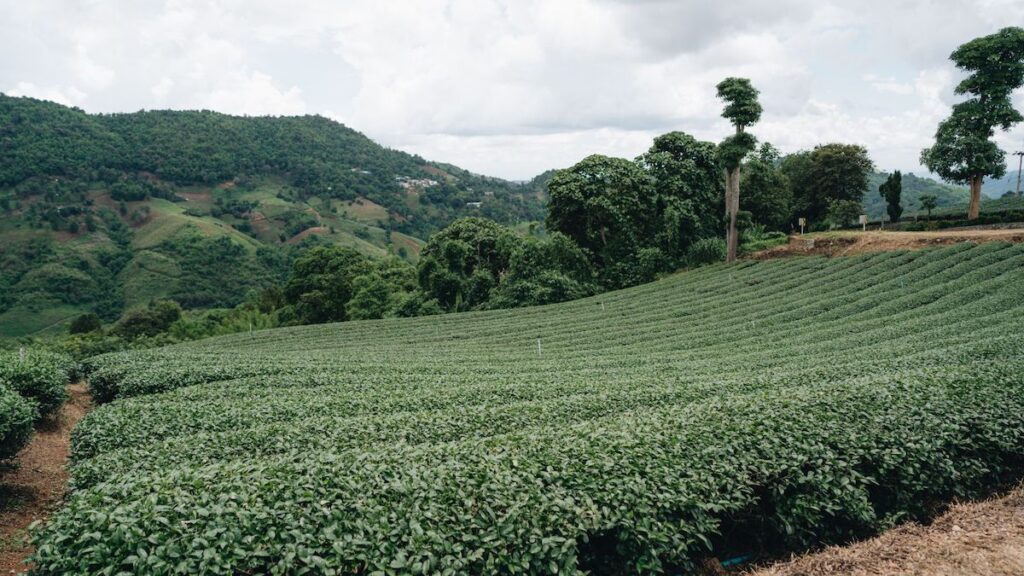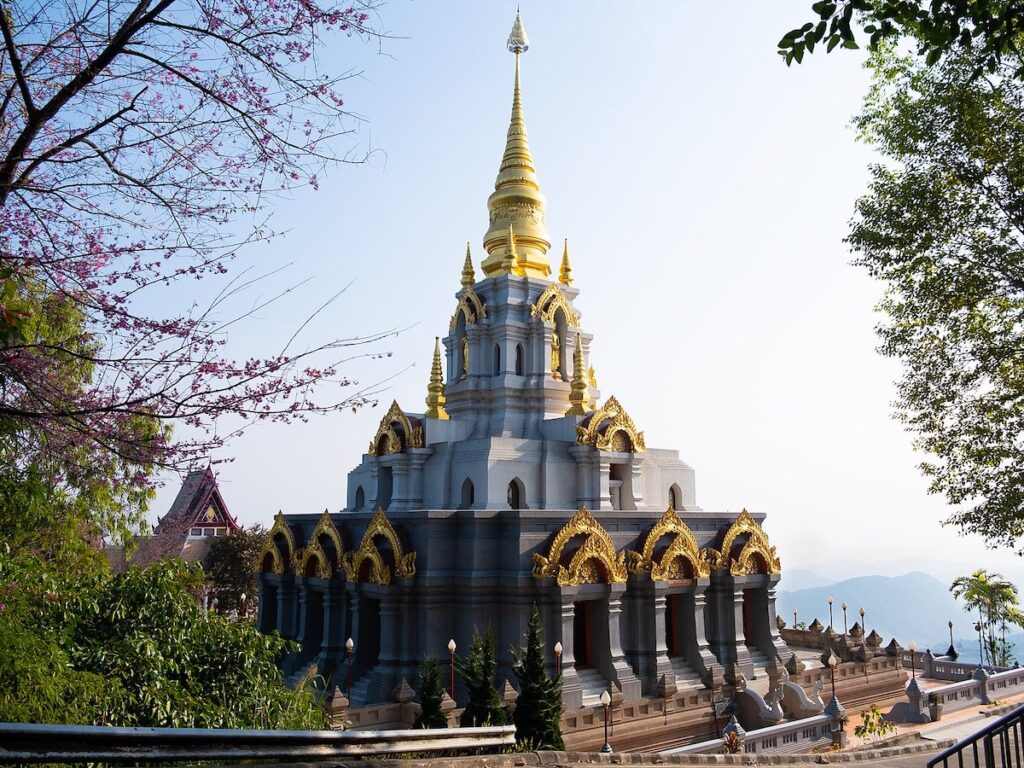Doi Mae Salong
When it comes to beverages in Thailand, coffee reigns supreme. Whether it’s hot, cold, or blended into a mocha frappe, locals can’t get enough of the energizing drink made from locally grown beans. However, there’s a hidden gem tucked away in the rolling hills of the northwest that offers an entirely different kind of warmth. Despite the overpowering love for coffee, this small community has fallen under the spell of a different hot beverage, and it holds the ultimate power over their hearts and taste buds.
The small town of Mae Salong lies midway between Mae Sai and Chiang Rai towards the Burmese border and was founded by Kuomintang (KMT) refugees during the 1970s. Having fled Mao’s communist uprising that caused the Chinese Civil War, these Yunnanese immigrants were offered official Thai citizenship if they fought off the mounting insurgency by Thailand’s own communist rebels.
This achieved they went on to settle in the country’s hilly reaches and formed their own community which retains their own culture. It is perhaps symptomatic of just how unique this village is that evening lessons are put on for both children and adults to learn the Thai language.
Doi Mae Salong Tea Plantations
Unlike many hilly areas of northern Thailand such as Doi Chang and Inthanon where coffee is king, tea remains the cash crop of choice for local people. There are many different varieties to choose from here, but the area is most famous for fragrant Formosa Oolong which can be found all over the town in dainty salons.
 Visitors can pop in anywhere for a free taster session and lesson on the different origins as well as growing, harvestings, and preparation methods. In fact, most restaurants and guesthouses will hand you a steaming cup before you’ve even walked through the door.
Visitors can pop in anywhere for a free taster session and lesson on the different origins as well as growing, harvestings, and preparation methods. In fact, most restaurants and guesthouses will hand you a steaming cup before you’ve even walked through the door.
Trekking is a big draw here and the rolling hillside is perfect for enjoying a leisurely stroll to waterfalls and Akha villages, or even something more challenging. There is a morning market at the center of town which is a great place to pick up an early breakfast, and a hill-tribe market on the main road heading south for picking up authentic souvenirs.
History of the Place
Although Doi Mae Salong remained almost completely cut off until relatively recently, the town is thriving off the new tourist boom of mainly Korean and Chinese visitors. The attraction is clear with Chinese script and red lanterns making the town appear much more at home in the Far East than in Thailand.
The reason for the area’s isolation is due to the poppy. The infamous opium lord Khun Sa set up camp at nearby Ban Hin Taek where his Shan United Army (SUA) was based. Such was the trafficker’s influence, from 1974 to 1994 the share of New York street heroin coming from the Khun Sa-controlled Golden Triangle rose from five to 80 percent.
But the narcotics kingpin was finally forced back into Burma where he surrendered to the authorities. Yet they refused to extradite him to the US to face drug smuggling charges – much to the chagrin of the DEA there – and he saw out the rest of his days in Rangoon, eventually dying in 2007 at the ripe old age of 73.
Since this time a variety of Royal Projects have turned the local people’s attention to growing honest crops that earn them a decent, and legal, living. Other than the ubiquitous tea shops, there is also a weird and wonderful range of insect-flavored herbal liquors – guaranteed to pack a punch (or perhaps that should be stung?)
Tea Was Introduced
The history of Doi Mae Salong tea plantations dates back to the early 1970s when the area was used as a camp by the Chinese army. In 1971, Doi Mae Salong became famous for the heroin refinery that was built there for opium cultivation. After the government put a stop to heroin production, farmers were forced to find new ways to sustain their livelihoods. They turned to the sweet cultivation of fruits, swapping drugs for apples and oranges. The land once used for poppy fields now bears the fruits of their labor, providing a healthier and more legitimate source of income for their families.
With the support of the then-prime minister, Kriangsak Chamanan, tea was introduced as a new crop to the region. The tea plantations flourished, and they became a symbol of the local economy. The production of tea helped the farmers to earn a decent income, and the residents of the area were able to maintain their traditional lifestyle.
The tea plantations of Doi Mae Salong are situated at an altitude of around 1,100 meters above sea level. The cool and misty weather of the region is ideal for the growth of tea. The tea produced in Doi Mae Salong is of premium quality, and it has a unique taste and aroma. The tea leaves are hand-picked, and the tea is processed in a traditional way, which adds to its distinctiveness.
Sunflowers bloom around Mae Salong during November, but the hills come alive with white plum blossoms and pink sakura cherry blossoms a month later in a feast of color that lasts until around February. It is extremely cold here during the winter months so remember to bring extra layers of warm clothing and proper shoes – especially if planning a trek.
Major Tourist Attractions in Doi Mae Salong
 Phra Boromathat Chedi
Phra Boromathat Chedi
The unmissable Phra Boromathat Chedi dominates the town from high up on the hill. It only takes around 20 minutes to walk up here (follow the track behind the morning market) but those not used to the altitude will find it tough going. The views from the top are definitely worth the shakey legs, however. There is a Chinese Martyrs Museum in honor of fallen KMT warriors, and General Tuan Mausoleum tells the story of the KMT leader who first founded the town.
Trekking is also very popular and can be arranged through guesthouses for around 400 baht for four hours, although many people report that the hill-tribe villages encountered are less than welcoming. There are also pony rides available although the health of the animals involved can be drawn into question and these are best avoided.
Phra That Srimahapo Mongkol Boonchum
If you’re looking for a unique and spiritual experience in Doi Mae Salong, the Phra That Srimahapo Mongkol Boonchum temple is definitely worth visiting. This Thai-Chinese temple was created by the people of Doi Mae Salong to celebrate the milestone anniversaries of King Bhumibol Adulyadej’s reign and birthday. Inside the temple’s main hall, you’ll find a revered Buddha image that the local people hold in high regard, surrounded by intricate Chinese architecture and sculptures that add to the temple’s overall beauty. It’s a peaceful and serene spot that’s sure to leave an impression on any visitor seeking a glimpse into the rich cultural practices of Doi Mae Salong.
Memorial Of Thai-Chinese Descent
The memorial at Doi Mae Salong is a testament to the efforts of the Chinese army in helping Thailand combat the spread of communism. The Thai-Chinese soldiers fought bravely in the Doi Luang, Doi Khao, and Doi Pha Mon regions in Chiang Rai province between 1971 and 1985. Their contribution to the cause was so significant that even today, many years later, they are remembered with gratitude and respect. The memorial is a fitting tribute to all those who sacrificed their lives for the greater good of their country. It is a must-visit attraction for anyone who wants to pay their respects to the brave soldiers who fought to protect Thailand’s sovereignty.
Tea Plantations
Doi Mae Salong is famous for its vast tea plantations that stretch over several kilometers.
The expanse of tea plantations that spread over the hills of Doi Mae Salong is a sight to behold. The carefully manicured rows of tea bushes thrive on the nutrient-rich soil and high-altitude climate of the region, producing some of the most fragrant and flavorful tea leaves in the world. You can witness the tea-picking process and learn about the tea-making process from the friendly farmers who gladly welcome visitors. As you walk through the verdant tea gardens, the tranquil atmosphere and the crisp mountain air will invigorate your senses.
Where to Stay and Eat in Doi Mae Salong
Shin Sane Guesthouse & Bungalow is the best-known place to stay in Mae Salong and boasts rooms for as little as 300 baht. They also have a decent restaurant and bar terrace. But there are lots of offerings around town with plusher places opening up all the time.
Traditional Yunnan cuisine from China’s western province is the draw here, with fragrant beef noodles one of the specialties. One of the best offerings is Salima Restaurant which also does a fantastic khao soi. There is little or no nightlife in Mae Salong with most of the restaurants closing well before midnight.
Getting to Mae Salong
Mae Salong is about half an hour west of Mae Chan, which is halfway on the Chiang Rai – Mae Sai road. Those taking the bus can ask to be dropped off at the turn-off where a collection of blue songthaews (shared taxis) wait to transport passengers to the town for 50 baht per person. Otherwise, those driving themselves can just follow the same route. The drive directly back to Chiang Mai via Fang is awe-inspiring with rolling tea-covered mountains slowly turning into the verdant karst cliffs around Chiang Dao.

 Phra Boromathat Chedi
Phra Boromathat Chedi